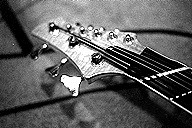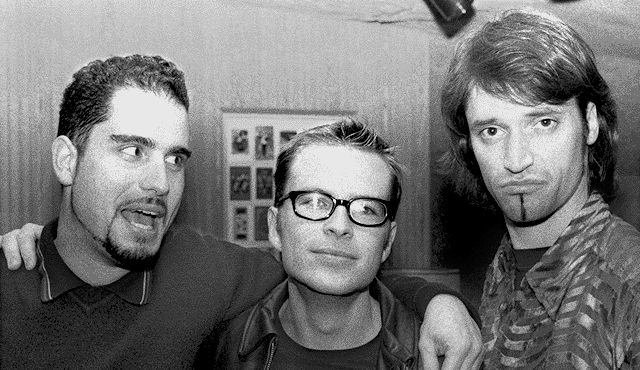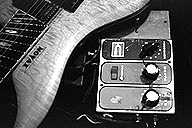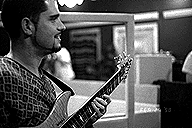
FEATURED VIDEO
Stanton Moore (with Charlie Hunter & Skerik)
"Kooks On Parade"
" Moore plays all over the beat on All Kooked Out, sometimes laying a bit behind it and letting things simmer, other times getting slightly ahead of it, making the music feel about to trip, just before his command of rhythm snaps things back into place. It is this aspect of his partnership with Hunter that is most impressive. Perhaps due to Hunter's rhythmic prowess -- he plays a custom eight-string guitar with three bass and five lead guitar strings, which he plays simultaneously -- he and Moore synch up so perfectly that when they accent a beat together, it sounds as if they're being directed. Hunter's talent also shines in his effort to not be overtly present on the record, proving that understated, supportive playing is more the sign of a great musician than any self-indulgent chops. "
(Alex Oliver, Offbeat Magazine, April 1998)

CHARLIE HUNTER
(the one on the left)Charlie Hunter is a superbad eight-string guitarist and former Blue Note artist. His unique axe has five guitar strings, three bass strings, and two pickups - allowing him to play bass and guitar at the same time...
Charlie was kind enough to participate in Stanton Moore's debut album All Kooked Out!
SPECIAL BULLETIN:
NEW PROJECT "GARAGE A TROIS"
RELEASES VINYL EP - OUT NOW ON FOG CITY!


Four months later, Charlie graciously agreed to join in on Stanton Moore's first solo record. The music reflects the good time that was had by all, of course. But we do suspect that the key drawing card for Charlie was Stanton's mom's southern cooking which arrived at the studio every afternoon...
Charlie was interviewed for the "Icons Among Us" documentary, which we highly recommend you seek out. Here's an excerpt:
" the whole concept of labeling things is, it's really a manifestation of living in a capitalist system where you need to bring things to market, you need to commodify things. And the easiest way to commodify a product is to name it and label it and give it a very specific focus so that your target audience, they'll be like 'boom this is product A' and then boom they're to product A. And a lot of that is kind of like manipulating the reptilian mind and our normal human tendencies towards that kind of group thing you know. And you know, in the early stages of my career I tried to fit into that cause I didn't understand how to relate all of the kind of cultural things I wanted to within this very, very narrow kind of a viewpoint. But I found that, that ultimately by slowly cutting off every possible (laugh) avenue of remuneration I could have for myself, I've come to a nice happy medium of being able to play the music that I want with the people I want, for the audience I want, more or less generally. Which is great. And I just think it's a lot harder work, you really have to put your nose to the grindstone. But ultimately it ends up being a lot more rewarding because you feel like you're really a part of, at the end of the night after finishing your gig, you just leave it there. Just feels good, you feel like you've communicated with the audience, they accepted you for what you are, and maybe that audience is only a hundred people instead of 10,000 people. But to me you know as long as I can manage to make a living and play for that kind of audience, that really makes me feel like I don't have to look over my shoulder, I don't have to feel like in a few years I'm gonna be really embarrassed you know. Although I have been embarrassed, but that's all part of the process you know"
Charlie's website includes a great online journal of Charlie's west coast "All Kooked Out!" tour - with sound clips from this incredible series of shows.